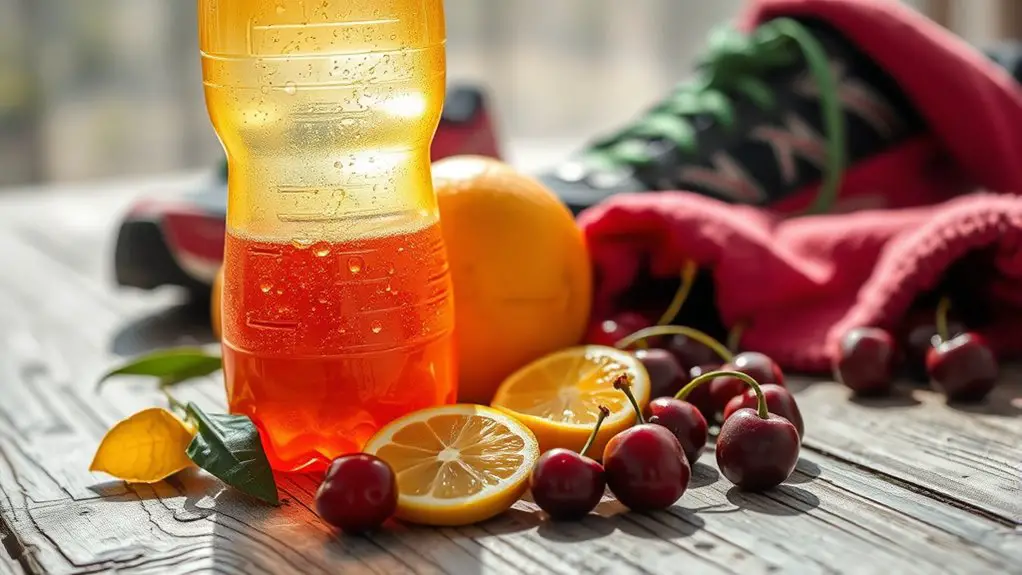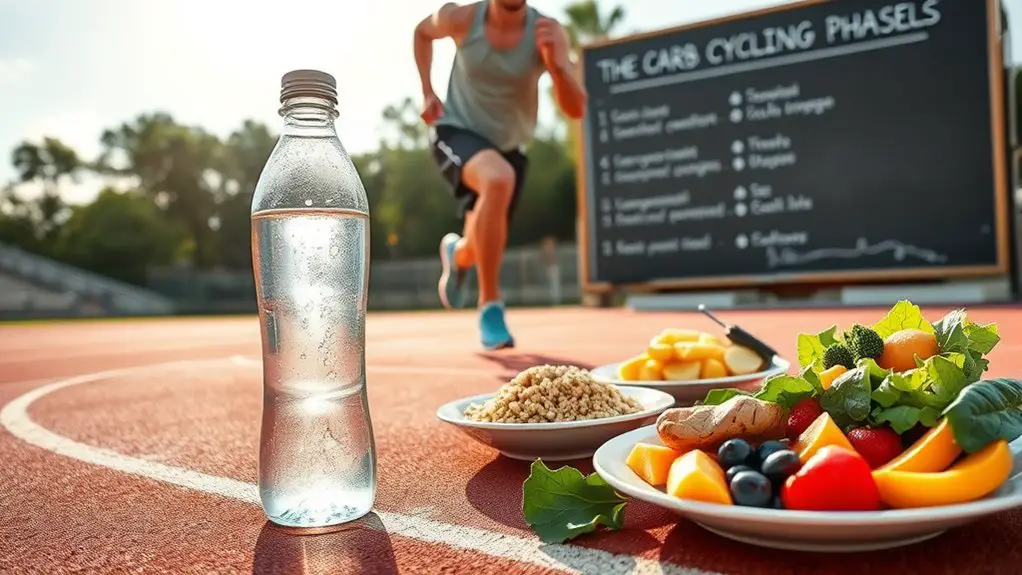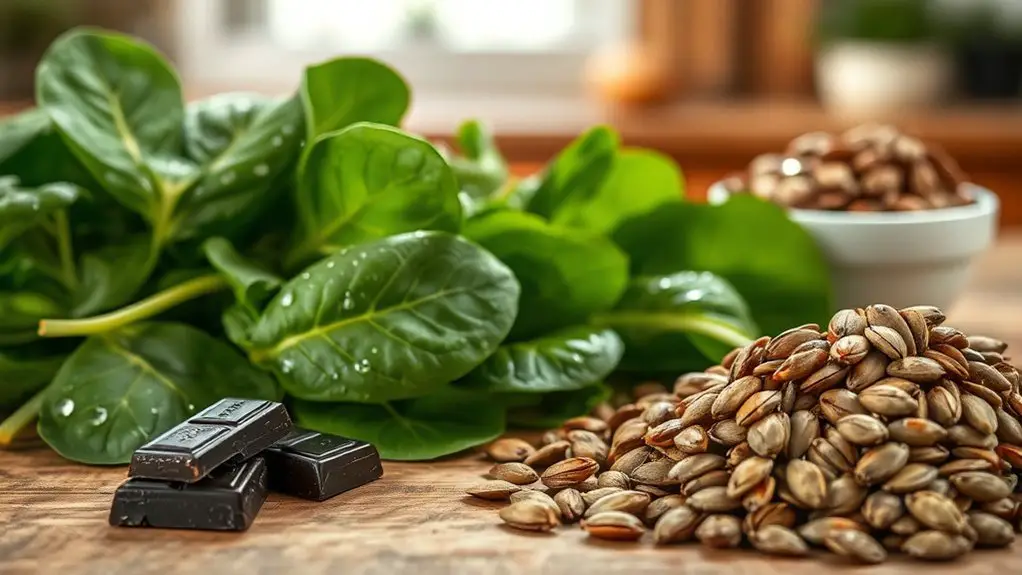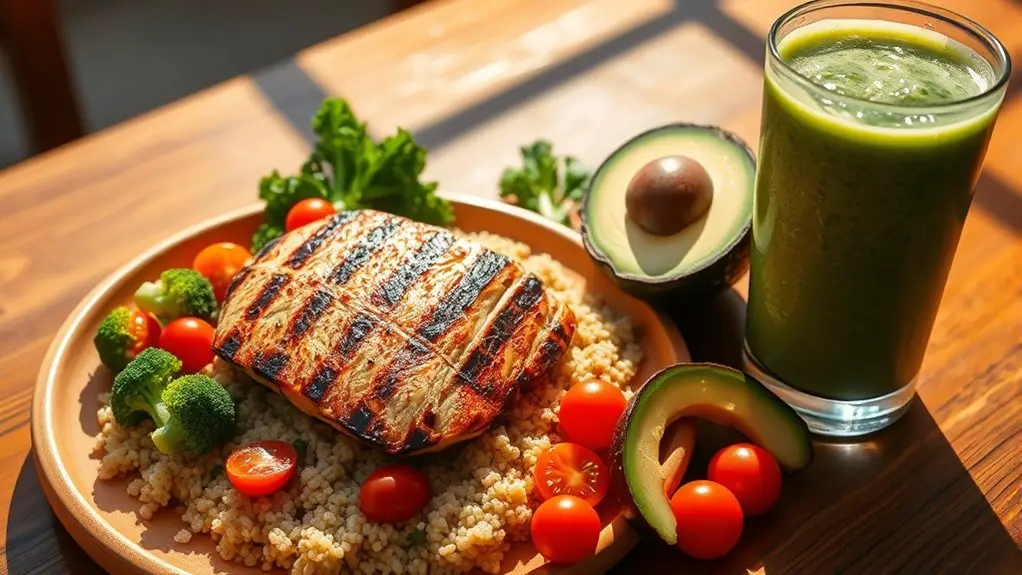Electrolytes are vital for you as an endurance athlete. They help regulate hydration, muscle contractions, and nerve function, preventing fatigue and cramps during long workouts. When you sweat, you lose essential electrolytes like sodium, potassium, and magnesium, which can hurt your performance. It's important to replenish these lost electrolytes through sports drinks or electrolyte-rich foods. Stay tuned to discover the best practices for maintaining your electrolyte balance and optimizing your performance.
The Role of Electrolytes in Athletic Performance
When you're pushing your limits during endurance activities, the role of electrolytes becomes essential for maintaining ideal performance. These significant minerals, including sodium, potassium, and magnesium, help regulate hydration, muscle contractions, and nerve function. Without proper electrolyte balance, you might experience fatigue, cramps, or even dizziness, which can hinder your freedom to explore your physical capabilities. Staying hydrated is critical, but it's equally important to replenish your electrolytes, especially during long workouts. Consider incorporating sports drinks or electrolyte-rich foods into your routine to keep your body in peak condition. By understanding the importance of these minerals, you'll be better equipped to embrace your endurance journey and enjoy the exhilarating highs of pushing your limits without the setbacks of imbalances.
Common Electrolyte Deficiencies in Endurance Athletes
Many endurance athletes unknowingly face electrolyte deficiencies that can considerably impact their performance. These deficiencies can lead to fatigue, cramps, and decreased stamina. The most common electrolytes you might be missing are sodium, potassium, and magnesium.
Here's a quick overview:
| Electrolyte | Symptoms of Deficiency | Sources |
|---|---|---|
| Sodium | Cramps, headaches, fatigue | Salt, pickles, broth |
| Potassium | Weakness, muscle cramps | Bananas, spinach, potatoes |
| Magnesium | Fatigue, muscle spasms | Nuts, seeds, whole grains |
Understanding these deficiencies can help you maintain your energy and endurance. By keeping an eye on your electrolyte intake, you'll feel more vibrant and ready to tackle any challenge.
How Sweat Affects Electrolyte Levels
As you push your limits during endurance activities, sweat becomes a double-edged sword; while it cools your body, it also strips away essential electrolytes. Every drop of sweat carries sodium, potassium, and magnesium, essential for maintaining balance in your body. When you sweat excessively, these minerals can dwindle, impacting your performance and recovery. You might feel great while running or cycling, but the longer you go, the more important it is to replenish what you've lost. Ignoring your electrolyte levels can lead to fatigue and decreased stamina, limiting your freedom to perform at your best. Stay aware of how sweat affects you, and embrace the freedom that comes with keeping your electrolyte levels balanced during those intense moments.
Signs of Electrolyte Imbalance
Electrolyte imbalance can sneak up on you, especially during prolonged endurance activities, leading to a range of warning signs that shouldn't be ignored. You might notice muscle cramps, fatigue, or a sudden drop in performance. If you're feeling dizzy, lightheaded, or excessively thirsty, your body could be signaling that it needs more electrolytes. Nausea or headaches can also arise, hinting at an imbalance. Even mood swings or confusion can creep in, affecting your mental clarity. Trust your instincts; if something feels off, it probably is. Staying in tune with these signs can help you maintain your freedom to push your limits and enjoy your activities without the nagging worry of fatigue or cramping. Stay aware, and listen to your body!
Best Sources of Electrolytes for Athletes
Recognizing the signs of electrolyte imbalance is just the first step; knowing where to replenish those essential minerals is equally important for endurance athletes. You want to fuel your body with the best sources. Here are some top options:
| Source | Electrolyte Content |
|---|---|
| Coconut Water | Potassium, Sodium |
| Pickle Juice | Sodium, Potassium |
| Electrolyte Tablets | Magnesium, Calcium |
| Sports Drinks | Sodium, Chloride |
Incorporating these into your routine can help maintain your balance, keeping you energized and ready to chase that freedom on the trails. So grab that coconut water or a sports drink, and let your body thrive!
Timing Your Electrolyte Intake
Timing your electrolyte intake can make a significant difference in your performance and recovery, especially during long endurance events. You don't want to wait until you're feeling depleted; instead, aim to consume electrolytes before, during, and after your activities. Pre-event, consider a small dose to prime your body. During the event, sip on electrolyte-rich fluids every 20-30 minutes to keep your energy up and your muscles firing. Post-event, replenishing lost electrolytes quickly can help speed up recovery and reduce soreness. Listen to your body; it knows what it needs. By syncing your intake with your activity, you'll enjoy enhanced performance and feel free to push your limits without the fear of hitting a wall.
Hydration vs. Electrolytes: Finding the Right Balance
During endurance activities, staying hydrated is just as important as replenishing electrolytes. You can't have one without the other; they work together to keep your body functioning effectively. When you're sweating, you're losing not just water but also crucial minerals like sodium, potassium, and magnesium. Ignoring either aspect can lead to fatigue, cramps, or worse. To find the right balance, listen to your body. If you feel thirsty, drink water; if you're sweating heavily, consider an electrolyte drink. Experiment during training to discover what works best for you. Remember, every athlete is unique—what fuels your freedom on the track or trail might differ from someone else's needs. Embrace that individuality and enjoy the journey of finding your perfect balance!
Tips for Maintaining Electrolyte Levels During Training and Competition
To keep your electrolyte levels balanced while training or competing, it's essential to plan ahead. Start by incorporating electrolyte-rich foods into your daily meals, like bananas, nuts, and leafy greens. During long sessions, don't forget to sip on electrolyte drinks; they can make a world of difference. Listen to your body—if you're feeling fatigued or cramping, it's a sign you might need a boost. Consider carrying electrolyte tablets for convenience. Remember to hydrate before, during, and after your workout. Timing is key, so aim to replenish within 30 minutes post-exercise. Finally, experiment during training to find what works best for you; this way, you'll be ready to perform at your peak when it counts.
Frequently Asked Questions
Can I Get Enough Electrolytes From a Balanced Diet?
"You are what you eat," so yes, you can get enough electrolytes from a balanced diet. Just focus on incorporating fruits, vegetables, nuts, and whole grains, and you'll likely meet your electrolyte needs effortlessly.
Are Electrolyte Supplements Necessary for All Endurance Athletes?
Not every endurance athlete needs supplements. If you're maintaining a balanced diet, you might get enough electrolytes naturally. Listen to your body; if you feel fatigued, consider adding a supplement to your routine.
How Do Temperature and Humidity Affect Electrolyte Loss?
When the heat's cranked up and humidity's thick, you're likely to sweat out more electrolytes. This loss can leave you feeling drained, so staying hydrated's key to keeping your freedom on the move.
Do Different Sports Require Different Electrolyte Needs?
Absolutely, different sports do require varying electrolyte needs. If you're running long distances, you'll lose more sodium than during a quick gym session. Adjust your intake based on intensity and duration for ideal performance!
Can Electrolyte Imbalances Affect Mental Performance During Endurance Events?
Can you really afford to ignore electrolyte balance during those long races? When your body's off-kilter, your focus and decision-making can suffer, making it tough to push through. Stay sharp, stay balanced!




